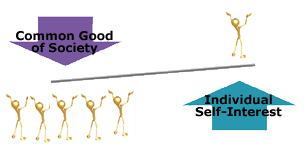UNIT 7: INDIVIDUAL AND COLLECTIVE RIGHTS
11. Balancing Rights in Society

What matters most: individual and collective rights and freedoms, or the common good?
This question is a key issue facing modern liberal democracies.
As citizens in democratic nations, we know that the goal of government today is to work for the common good of their people. While early liberal governments focused on ensuring rights and freedoms were protected, today's governments have a larger
role. Not only do they protect people from harm though maintaining the rule of law, but they also consider positive freedoms for their people.
Today's globalizing world faces with many complex issues.
- Can economic freedom continue when the environment is being destroyed?
- What kind of economic freedom do people have if they live in absolute poverty?
- How do governments decide what is right and what is wrong when societies are composed of people with multiple perspectives?
- How can individual privacy be secured while terrorism is a threat?
- Can we allow freedom of the press when it might compromise the security of individuals?
- Should there be censorship to protect religious views from being offended?
- To what extent should individual/collective rights and freedoms be suspended during times of global pandemics?
Modern liberalism needs to evolve in order to deal with these daily concerns of people around the world. In this section, you will consider some contemporary challenges in liberal democracies, including environmental concerns, poverty (both
global and local), gender issues, multiculturalism, pandemics, terrorism, and censorship. You will look at how liberal
democracies try to find a balance between the protection of rights and
freedoms and the collective interest of society.
Is it possible to follow the principles of liberalism in today's world?